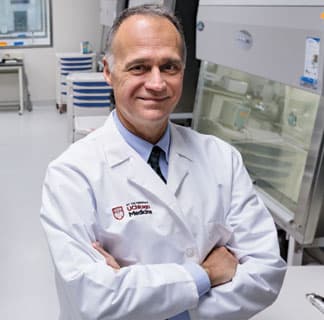‘A one-and-done treatment’: UChicago Medicine among the first in the U.S. to use TIL therapy for advanced skin cancer

For 15 years, Alla Pinzour traveled the country seeking treatments for her advanced melanoma. Some would bring temporary remission, but her skin cancer always returned.
“Surgeries, chemo, radiation — you name it, I had it done,” she said. “Nothing seemed to work.”
By early 2024, Pinzour’s skin cancer had spread to other places in her body, including her lungs and stomach. As her health deteriorated, the only thing doctors could do was re-try treatments she’d already tried.
That’s when Pinzour’s oncologist told her about a groundbreaking new melanoma treatment that would soon be offered at the University of Chicago Medicine.
The use of tumor-infiltrating lymphocyte therapy, also known as TIL therapy, boosts a person’s cancer-fighting cells to help their own immune system kill the cancer.
In mid-February 2024, the Food and Drug Administration approved the use of TIL therapy for advanced melanoma. Weeks later, Pinzour became the first person in the Midwest — and one of the first in the country — to have the commercially approved treatment.
“We did a lot of planning and training with the research team and the operating room nurses and staff, so as soon as the FDA said ‘Go,’ we were the first ones to do it,” said Pinzour’s surgeon, UChicago Medicine surgical oncologist Mecker G. Möller, MD.
The results have been dramatic. The cancerous tumors under Pinzour’s skin started to shrink soon after. Her latest scan, in July, showed even more positive clinical response, Möller said.
“If it continues to work, this might be the only treatment she ever needs,” said UChicago Medicine oncologist Daniel Olson, MD, who helped administer Pinzour’s TIL therapy. “A one-time infusion of these cells can sometimes drive melanoma into remission.”
Pinzour, now 50, said she feels great. She plans to return to her catering business and may take a celebratory vacation with her husband in Europe.
“I’ve been waiting for this for many, many years,” said Pinzour, a mother of two who lives in north suburban Hawthorn Woods. “I would have gone anywhere in the world to get this, but I was able to get it right here in Chicago.”
UChicago Medicine doctors have since used TIL therapy on other patients with advanced melanoma, and more are scheduled in the coming months.
“TIL therapy gives patients hope when there wasn’t any before,” Olson said. “We’re the only people doing it in Chicago right now. It’s a really complicated therapy that takes a well-oiled process to make it happen, but we’re doing it.”
How does TIL therapy for skin cancer work?
TIL therapy was developed in the 1990s by the National Cancer Institute, but it’s a complex therapy that took decades to fine-tune, Olson said.
It involves a two-step process. First, the patient’s own cancer-fighting T cells (tumor-infiltrating lymphocytes, or TILs) are surgically removed from their tumor. The cells are sent to a lab, where they’re strengthened and multiplied into the billions.
Then, the supercharged TILs are frozen and returned to the hospital. After being carefully defrosted, the cells are returned to the body through an IV. The excessive number of TILs, far more than typically found in a person’s body, helps provide the power to destroy the tumor.
“It’s a one-and-done treatment,” Olson said.
Patients will see their oncologist once or twice a week for the first month to monitor blood counts and check for complications. At three months, they will receive an imaging scan to see if the tumors are shrinking.
TIL therapy success rates
Despite seeing positive results in his patients, Olson notes that TIL therapy doesn’t work for everyone. Only one-third to one-half of all patients will see a benefit, he said, and most advanced melanoma patients will not get long-term remission.
“The clinical trials have already been run, so we know our expectations going into it,” he said. “Still, for patients with melanoma who don’t respond to the standard therapy, it’s the best thing out there.”
That’s good news for patients like Pinzour, who in 2009 noticed a tiny mole on the bottom of her leg. When it started to grow, she saw a doctor who confirmed it was melanoma.
At the time, there was only one available drug to treat melanoma and Pinzour didn’t tolerate it well. But she kept taking it, and her cancer went into remission until 2015, when the drug was no longer effective. She’s been tirelessly fighting the disease ever since.
When Pinzour heard about TIL therapy, she immediately reached out to UChicago Medicine, whose medical oncologists and scientists at the David and Etta Jonas Center for Cellular Therapy continue to study the wider potential of TIL therapy for tumor types, including cervical cancer.
“TIL therapy has changed the landscape of how we treat melanoma,” said Möller, who also directs the Regional Cancer Therapies program.
UChicago Medicine’s TIL therapy team includes Olson; Möller; surgical oncologist and Vice Chair of Global Surgery, J. Michael Millis, MD; surgical oncologist Thomas F. Gajewski, MD, PhD; Director of the Cell Therapy Program, Mylove Mortel, MSPH, RN, OCN; endocrine and neuroendocrine surgeon Xavier M. Keutgen, MD; Director of Surgical Cancer Quality Ryan Merkow, MD, MS; Director of Melanoma Surgery Cristina O’Donoghue, MD; and Director of the Hematopoietic Stem Cell Transplantation Program, Michael R. Bishop, MD.

Mecker G. Möller, MD
Mecker G. Möller, MD, is a Professor of Surgery and Director of UChicago Medicine's Regional Therapies Program and Surgical Oncology Fellowship Program.
Learn more about Dr. Möller
Daniel Olson, MD
Daniel Olson, MD, is a highly skilled oncologist who specializes in diagnosing and treating skin cancers and sarcomas. He is an expert in advanced medical oncology treatment methods, including new cellular therapies such as tumor-infiltrating lymphocyte (TIL) therapy for melanoma.
Learn more about Dr. Olson
Leaders in Cellular Therapy Care & Research
Cellular therapy — the transfer of human cells to heal or replace damaged tissue or cells — holds much promise for patients with cancer and other diseases. UChicago Medicine physicians are pioneers in cellular therapy care, including CAR T-cell therapy, stem cell transplantation and TIL therapy.
Learn more about cellular therapy at UChicago Medicine